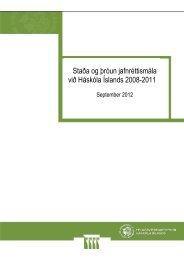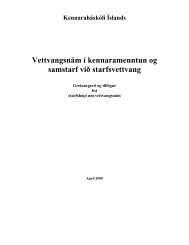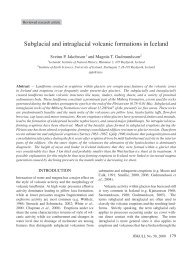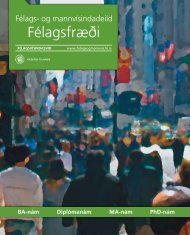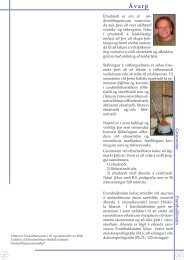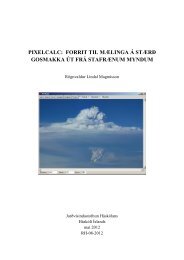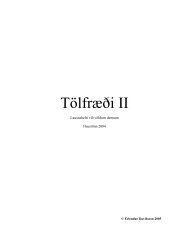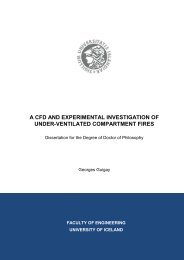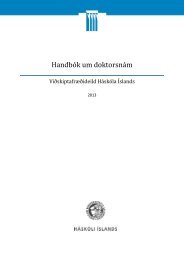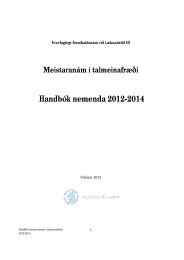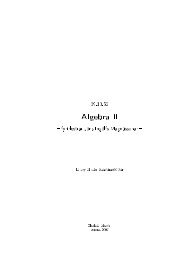Journal of Germanic Linguistics Late Placement of the Finite Verb in ...
Journal of Germanic Linguistics Late Placement of the Finite Verb in ...
Journal of Germanic Linguistics Late Placement of the Finite Verb in ...
Create successful ePaper yourself
Turn your PDF publications into a flip-book with our unique Google optimized e-Paper software.
238 Haukur orgeirsson<br />
violated <strong>in</strong> unbound clauses, but Kuhn’s laws <strong>of</strong> sentence particles and<br />
sentence open<strong>in</strong>gs are also abandoned wholesale. To at least some extent,<br />
<strong>the</strong>se seem to be <strong>the</strong> effects <strong>of</strong> a strong preference for <strong>the</strong> stylistic front<strong>in</strong>g<br />
<strong>of</strong> <strong>the</strong> most important semantic element, but o<strong>the</strong>r factors may be at<br />
work as well. The syntax <strong>of</strong> ljóaháttr is a rich subject for study (see,<br />
most recently, órhallur Eyórsson 2009:71–75) but is not my focus<br />
here.<br />
The fornyrislag meter is <strong>the</strong> most direct Old Norse descendant <strong>of</strong><br />
<strong>the</strong> common <strong>Germanic</strong> alliterative verse. In general, <strong>the</strong> dist<strong>in</strong>ction<br />
between bound and unbound clauses is observed <strong>in</strong> it, as <strong>in</strong> <strong>the</strong> follow<strong>in</strong>g<br />
strophe from Helgakvia Hjrvarssonar 10: 3<br />
(5) Ertattu, Hiorvarr, art-not-thou Hiorvarr<br />
heilrár konungr, wholesome-counseled k<strong>in</strong>g<br />
fólcs oddviti,<br />
host.GEN leader<br />
óttu frægr sér; though-thou famous be<br />
léztu eld eta<br />
hadst-thou fire.ACC eat<br />
i<strong>of</strong>ra bygir,<br />
k<strong>in</strong>gs.GEN settlements.ACC<br />
enn eir angr viic yet <strong>the</strong>y harm.ACC to <strong>the</strong>e<br />
ecci goro.<br />
none did.PL<br />
‘You, Hirvarr, leader <strong>of</strong> <strong>the</strong> host, are not a k<strong>in</strong>g <strong>of</strong> wholesome<br />
counsel though you are renowned. You had fire eat <strong>the</strong> settlements <strong>of</strong><br />
<strong>the</strong> k<strong>in</strong>gs, yet <strong>the</strong>y did you no harm.’<br />
The strophe <strong>in</strong> 5 conta<strong>in</strong>s two unbound clauses, start<strong>in</strong>g with ertattu ‘you<br />
are not’ and léztu ‘you had’, and both have <strong>the</strong> f<strong>in</strong>ite verb as <strong>the</strong>ir first<br />
constituent. The two bound clauses, start<strong>in</strong>g with óttu ‘though you’ and<br />
enn ‘yet’ both have late placement <strong>of</strong> <strong>the</strong> f<strong>in</strong>ite verb. However, while <strong>the</strong><br />
difference between bound and unbound clauses is normally observed <strong>in</strong><br />
fornyrislag, <strong>the</strong>re are some exceptions. Those exceptions are <strong>the</strong> subject<br />
<strong>of</strong> this article.<br />
3 This and all subsequent citations <strong>of</strong> poetry from <strong>the</strong> Codex Regius <strong>of</strong> <strong>the</strong> Poetic<br />
Edda are from Neckel 1983.



